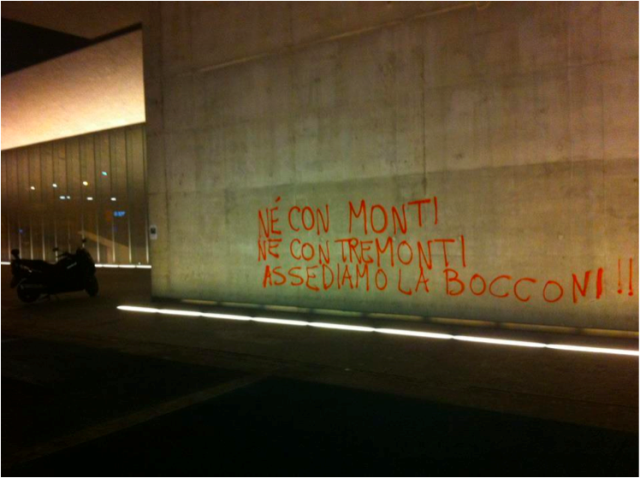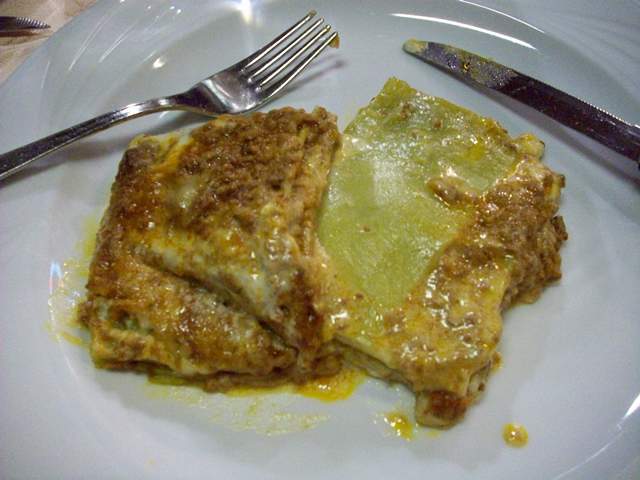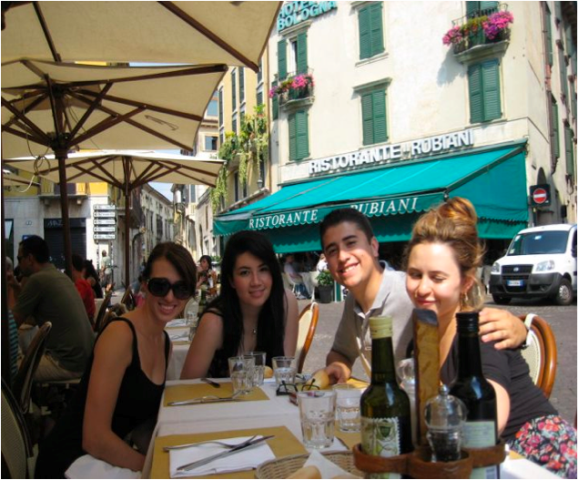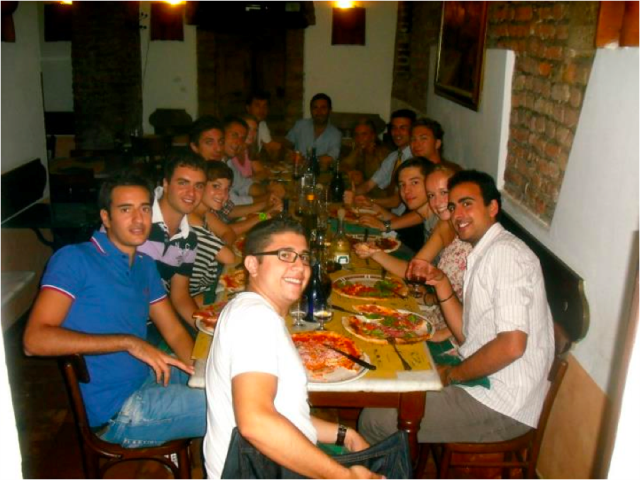Un Bocconiano per Sempre- My Study Abroad Experience at Universitá Bocconi
By: Camillo Moreno-Salamanca, Foster Undergraduate
The best stories are those that you can recall detail by detail, despite the fact that it may have occurred months, or years ago. Now, I got back from my study abroad trip about two-and-a-half months ago, but this experience feels like one of those stories.
It also makes for a great excuse for having postponed posting my experience for so long. Last time I wrote on this blog, I gushed about the great things in Italy. At this point in time, the feeling is the same. But now, I believe I can provide an objective and comparative review of my study abroad experience, so that you can benefit fully from all those times I traveled, went out to dinner with friends, learned Italian, consumed wine—and went to class.
I’ll break it down into what I loved, what I didn’t love, and some reflections and mindsets, which I hope are as useful to you, as they were to me. I’ll start with what I loved about Italy:
The Food
I’ll start with an universal truth popularized by Julia Roberts in “Eat, Love, and Pray” (Yes, I watched it. But I watched it in Italian to learn the language so I didn’t lose any “bro” points). The food in Italy is amazing. Actually, glorious is a more fitting word. If there is something you need to know about me is that I am by no means a foodie.
To my mother’s chagrin, my diet has revolved around the plainest, no-frill foods you can think of. I call them the
BRiC (Bread, Rice, and Chicken).
However, I gave myself an opportunity to expand my palate and truly embrace everything Italian food had to offer. Well, it was tremendously worth it. While Italian food is relatively simple; in its simplicity lies its beauty and its flavor. Pizza, pasta, gnocchi, risotto—you name the Italian dish, and I probably tried it (with the exception of Sicilian cuisine…too far from Milan). To this day I have flashbacks of the Lasagna alla Bolognese that I had—in Bologna. Or, the time I finally perfected making spaghetti alla carbonara and basked in my accomplishment by emptying the box of barilla and promptly enduring a joyous food coma.
My point is this: The food is fantastic and in enjoying it you will actually learn lots about Italian culture. You will learn that food tastes best when it is genuine, simple, warm, and working in ensemble with other ingredients—much like Italian culture.
The Crisis and the Classes
The second thing I loved were actually a couple of my classes, and what I was lucky enough to witness in Italian history during my time at Bocconi. I’ll start with a warning about the classes: Find out if your class has an oral exam. If it does, I would strongly suggest avoiding it. Typically, I do great in high-pressure/interview situations (What up, Boeing!). However, in oral exams 100% of your grade is riding on what you say, how well you say it, and whether the professor likes you or not. I’ll rather hedge the risk of having one terrible exam by having assignments and projects peppered in, than having it ride all in a 10-minute session.
With that said, there are two classes I recommend, not only because these were the first classes I 4.0’d in college (who says you can’t do well academically in study abroad programs), but because they were pretty fun,
interesting classes. The first class I loved was Public Management. It was a very engaging discussion based class where you learn the management philosophy in the public sector, and how much more complex it is than the private sector. Also, through this class you get to compare how different societies operate in the public sector and you are able to trace how certain flaws in public sector management (like in Italy) can have profound consequences in economic development. My instructors were Valentina Mele and Aleksandra Torbica.
The second class was Management of Fashion and Luxury Companies. Despite the fact that I am naturally interested in fashion, this is a fantastic class that dives deep into the way different brands, markets, and
industries position themselves in the marketplace, how they develop their strategies, and what their best practices are. Plus, you are in freaking Milan! What better place to take a fashion class than in the fashion capital of the
world? For our project, we had to evaluate a brand. We chose Diesel, and had the amazing opportunity to visit their flagship store in Milan. It doesn’t get much cooler than that folks.
Certainly, these are not the only awesome classes Bocconi has to offer, but they were my favorites. On a brief side note, Bocconi also has pretty cool student clubs (they don’t have the support or impact that Foster RSOs have, but they have a radio station, a TV station, sports clubs, and a variety of other cool clubs. Definitely check them out!).
 Oh yeah, the big political event that I had to witness. For those of you that were in tune with the world news in the fall of 2011, you knew that the European Union was—well, doing its best Titanic impression. One of the captains of this shipwreck was Italy itself, as it found itself in not as deep of a financial trouble as Greece, but with overleveraged banks, had a high risk of submerging Europe and the world, into another worldwide crisis. At the helm of this crisis, we had Milan’s favorite son, Mr. Silvio Berlusconi. A charming, cynical, astute politician that had been able to dominate Italian politics (and media), for over two decades while presenting itself as the man Italians
Oh yeah, the big political event that I had to witness. For those of you that were in tune with the world news in the fall of 2011, you knew that the European Union was—well, doing its best Titanic impression. One of the captains of this shipwreck was Italy itself, as it found itself in not as deep of a financial trouble as Greece, but with overleveraged banks, had a high risk of submerging Europe and the world, into another worldwide crisis. At the helm of this crisis, we had Milan’s favorite son, Mr. Silvio Berlusconi. A charming, cynical, astute politician that had been able to dominate Italian politics (and media), for over two decades while presenting itself as the man Italians
couldn’t hate because all Italians have a little Silvio in them. Fortunately, this crisis brought a call to sanity, and a change of guard. Silvio Berlusconi found himself unable to solve the economic crisis in Italy and was forced to
step down. His replacement? None other than Bocconi’s very own president Mr. Mario Monti (otherwise known as Super Mario).
It was very interesting reading the newspapers, talking with Italians, and just feeling the winds of change. Oh, and did I mention two days Mr.Monti assumed power thousands of public school students marched through Milan and vowed to “siege Bocconi” and were stopped a couple of streets away from the University by the police? Well, that happened. See, something you have to know about Bocconi is that your typical Italian isn’t very too fond of Bocconi, as it is a bit elitist. Think of it as the Yale of Italy. While this is not the preferred image by Bocconiani everywhere, and not fully true, there is a sound logic behind that perception, and part of your exchange experience will be understanding that you are going to the best (and probably most hated) university in Italy; more on this later.
The European Lifestyle
Finally, I loved interacting with a variety of people from around the world. This was my absolutely favorite part. From Brazil to Russia, from Taiwan to New Zealand, and of course pretty much every country in Europe; I had the amazing blessing of interacting and becoming friends with people from all different countries. They taught me about life in ways that books or National Geographic documentaries couldn’t quite communicate to you. This is why you travel. From small things like the reason why you look at somebody in the eyes while you toast (to avoid seven years of bad sex; there is your excuse), or the not so small things like the fact that in many European countries healthcare is a right, just allowed me to engage in wonderful discussions and learning experiences. Needless to say, this exchange experience makes you form a certain bond with people that is cemented by the unique experience you are living together; and sure, while now we have Facebook, Skype, and Whatsapp to keep in contact with them, it’s not quite the same. But the fact that you developed these memories with people from different corners of the world really puts in perspective how lucky you truly are. It also makes for a ton of inside jokes that once you are back in the US, don’t seem quite as funny.
Finally, I’ll end my ramble by giving you three quick tips to make sure your study abroad experience is successful:
1) Get out there and learn the language: It frustrates me when I see tourists or even other exchange students not speaking the native language. Especially when some of them took a crash course on Italian. Sure, I had it easier than a lot of people since I already knew Spanish, but I arrived into Italy with a dictionary and a phrasebook. Nothing else. I pushed my boundaries and took baby steps. Whenever I would go my neighborhood pizza store and buy lunch I would do it all in Italian, even if I butchered the words. It took me about 2 weeks to figure out that “mangia qui?” meant “for here”, but once I figured it out, I was pretty proud. So get lost, ask a lot of questions, don’t be so self-conscious, and just know that even if you speak it “funny” people will appreciate and respect the fact that you are trying.
2) Meet people you wouldn’t usually meet: Another thing that frustrated me was seeing students (mostly American students) hang out with other American students, or with Canadian, Australian or English students (Long live the queen!). It’s totally fine to bond with people you have cultural similarities to. In my case, it was pretty easy to bond with the Spaniards and South Americans in my exchange class. However, make sure you are meeting people from backgrounds you wouldn’t experience at home. I met more Swedish, German, Dutch, French, Swiss, and Italian people that I had ever met in my life. Learning about our similarities and differences was the biggest takeaway from this experience. Forging a friendship with them? Priceless.
3) If you are getting homesick, you aren’t busy enough: Yes, you will get homesick in your exchange. It happens. But when it happened to me, I focused on the fact that my family was proud of me for living this experience and that the best way to honor them would be to take advantage of the opportunity and stay busy, always learning, and always enjoying. What good does it do that you miss your family/friends so much and you sit in your room sulking and looking over Facebook photos? None. What will you tell them about your experience? Will you
tell them that you mostly missed them? Is that the type of answer you think they want to hear?
Alas, this is the end of my not-so-short summary of my study abroad experience. Magari mia esperienza sará utile per voi. Buon viaggio, e ricorda: Mangia, vive, impara, e ama.




